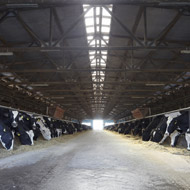Fears grow over low protein silage

Warnings were issued about the potential risks associated with feeding spring calving suckler cows low protein grass silage.
A dead cow has confirmed earlier suspicions that silage with insufficient protein levels is being fed to livestock this winter.
The SRUC are advising farmers to check protein levels in their silage after the animal was submitted to one of their Veterinary Investigation Centres.
Vets from the SAC Consulting Division of the SRUC diagnosed rumen impaction, further indicating the potential cause of death as over consumption of low protein grass silage.
Rumen impaction affects the first stomach of a cow, which contains millions of microbes for the digestion of plant material. Animals not receiving enough protein to supply the microbes in the rumen suffer blockages as a result of slow digestion. Food cannot progress into the next part of the digestive system leaving less space for new feed.
Warnings were issued about the potential risks associated with feeding spring calving suckler cows low protein grass silage.
Heather Stevenson, veterinary investigation officer, said: "In November SRUC warned that our analytical labs had identified that there were more lower protein silages around than usual this winter.
"Animals not receiving enough protein from their feed often look healthy and full which means their condition is sometimes not discovered until too late".
Not exclusive to cows, rumen impaction can affect other ruminants fed on similar silages. Although sometimes firm, dry dung can be an indicator of the condition, the SRUC are recommending that farmers who have not analysed their silage recently do so urgently. Body condition score assessments enable farmers to group and feed livestock accordingly with any necessary feed supplements.
The SRUC’s SAC Consulting office can offer advice specifically about rationing suckler cows. For further expert guidance, concerned farmers can contact their local SAC Consulting office or veterinary practice.



 FIVP has shared a survey, inviting those working in independent practice to share their views on the CMA's proposed remedies.
FIVP has shared a survey, inviting those working in independent practice to share their views on the CMA's proposed remedies.